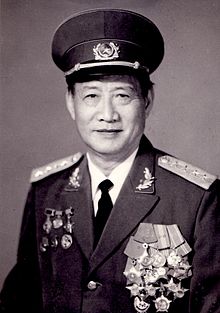Hoàng Văn Thái
Hoàng Văn Thái (born May 1, 1915 in Thai Binh Province, † July 2, 1986 in Hoang Van Xiêm ) was a Vietnamese communist, general and politician. During the Tet Offensive , he was North Vietnam's highest ranking officer in South Vietnam.
Life
Hoang Van Thai joined the Indochinese Communist Party in 1938 . Persecuted by the colonial authorities, he fled to the Republic of China in 1941 . There he was trained at a military academy in Guilin . In 1944 he returned to Indochina where he was used for propaganda and intelligence purposes for the developing Viet Minh . In December 1945 he became chief of staff of the Viet Minh armed forces. In 1948 he was promoted to major general. Shortly before the beginning of the battle for Điện Biên Phủ , Hoang Van Thai was recalled as chief of staff. He was succeeded by Van Tien Dung .
In January 1948 he was promoted to one of the first generals of Vietnam. On August 31, 1959, he was promoted to the rank of lieutenant general. In 1966 he was assigned to Military Region V as Commander and Political Commissar . From 1967 to 1973, when he was assigned to the South, he was commander of the South Vietnamese Liberation Army and the deputy COSVN. In the battle of Loc Ninh, he was Commanding Officer (October 27, 1967 - December 10, 1967), also during the Tet Offensive in January 1968. In April 1974, he was appointed to the rank of General Colonel promoted. He was appointed Deputy Minister of Defense, First Deputy Chief of Staff, and a permanent member of the Central Military Committee. In January 1980 he was promoted to general. He was a member of the Central Committee of the Communist Party of Vietnam and a delegate to the Seventh Party Congress. On July 2, 1986, he died suddenly after a heart attack at 108 Army Hospital.
Prizes and awards
- Order of the Golden Star (the most prestigious order in Vietnam, awarded posthumously in 2007),
- Order of Ho Chi Minh City, 2nd class
- Order of Resistance, 1st class
- Order of Victory
A street in Hanoi City (Thanh Xuan District) and in Ho Chi Minh City (District No. 7) was named after him.
Individual evidence
- ↑ Christopher E. Goscha : Historical Dictionary of the Indochina War (1945-1954) , Copenhagen, 2011, p. 216
| personal data | |
|---|---|
| SURNAME | Hoàng Văn Thái |
| BRIEF DESCRIPTION | Vietnamese communist, general and politician |
| DATE OF BIRTH | May 1, 1915 |
| PLACE OF BIRTH | Thai Binh Province |
| DATE OF DEATH | 2nd July 1986 |
| Place of death | Hoang Van Xiêm |
